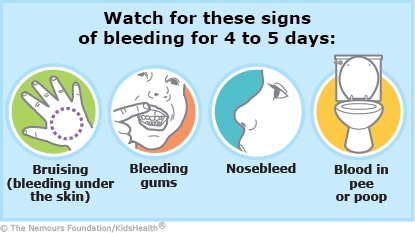Most types of rat poison rarely cause serious problems if they're ingested by a child. Kids often do not swallow enough to become seriously ill. If they do, though, it can cause health problems. The effects of rat poison might not be seen for a few days. So after making sure that your child was well enough to go home, the health care provider might have instructed you to watch your child for symptoms for a few days.
The most common types of rat poisons kill rodents by causing them to bleed or by increasing the level of calcium in the body, which affects the heart. Depending on the type that your child swallowed, the health care provider may have ordered blood tests to see how the poison might have affected your child's body (for example, to see how the blood is clotting or to check the level of calcium in the blood). If they did these tests, they want to repeat them in a few days to compare the results and check for any new problems. Your child also might have gotten a vitamin K supplement to prevent bleeding issues.



Your child:

Your child:
Call 911 if your child is having seizures (body movements that look uncontrolled) or trouble breathing or swallowing.

What can help prevent kids from swallowing poisonous things? Lots of things around the house can be poisonous if not used properly. Besides rat poison and other pesticides, these include medicines, cleaning products, laundry detergents, paints, cosmetics, alcohol, and nicotine products (like cigarettes and e-cigarette products). Always keep these out of children's reach in a locked cabinet. Never store them in containers that were once used for food or drinks.
What should I do if my child swallows something poisonous again? Call Poison Control right away for advice (800-222-1222). Keep the number posted in your home (for example, on the refrigerator) and put it in your phone contacts.